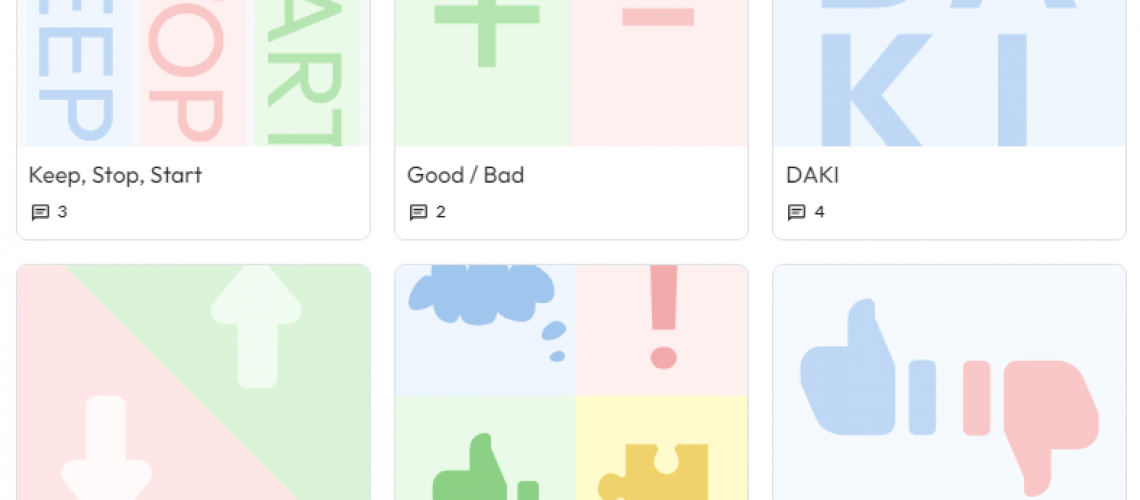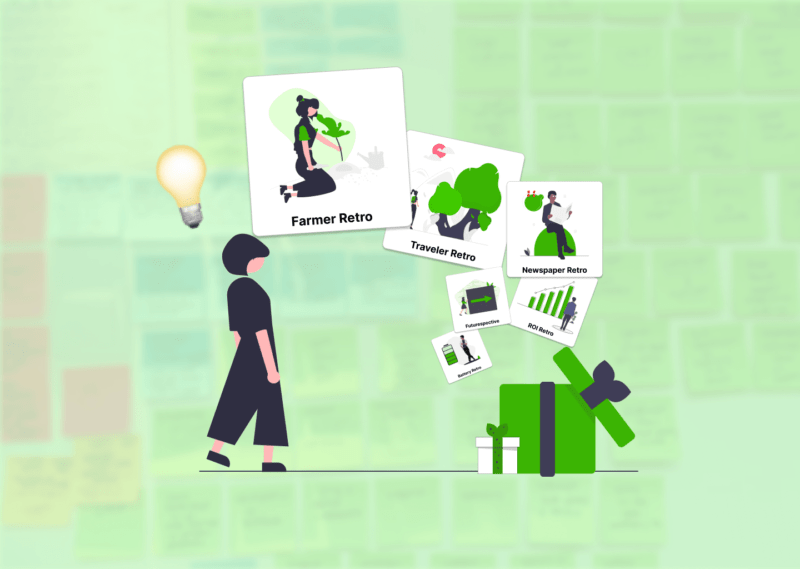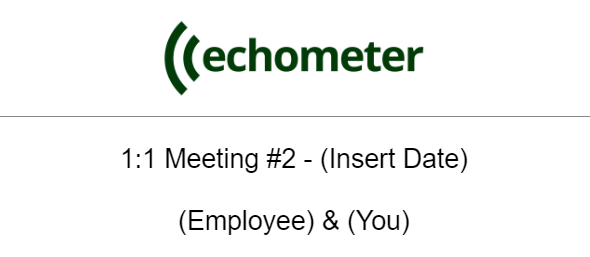Table of Contents
Are you looking for cool retrospective techniques to enhance your retrospective? – Then you've come to the right place!
I have put together more than 20 retrospective techniques for you here, which you can get a first impression of and use directly for yourself if you are interested.
In addition to the classics such as the Mad Sad Glad retro technique or the 4 Ls retrospective technique, I have also included new retrospective techniques that you have certainly not yet heard of. These fun retrospective techniques include, for example, the Tetris retro, the five Agile values retro or the retrospective techniques of the four seasons.
Long story short: If you need inspiration for new retrospective techniques, you're sure to find it here.
What makes a retrospective successful?
Of course, in addition to retrospective techniques, there are other factors that can help make your next retrospective a success. As a company that helps thousands of teams to conduct better retrospectives, we have now gained insights into well over 50,000 retrospectives and have been able to identify commonalities in retrospectives that were rated as particularly successful by the participants.
The most influential factors are:
- The right day of the week: Friday is the most promising day of the week for a retrospective.
- The ideal duration: 30 to 60 minutes is ideal for a retro.
Basically, the longer the retro, the worse the result. - The optimum team size: the smaller the team, the greater the commitment and success.
- The best retro routine: 7-14 day intervals of retros lead to the best results.
Do you want to understand in more detail what characterizes the most successful retrospectives? Take a look at our analysis: Analysis of 30k retrospectives
We have also summarized other useful resources that improve working with Retrospective techniques:
- An entry guide for retrospectives.
- How to define valuable "measures.
- Our full retrospective agenda.
- "Psychological safety" for agile teams.
- The best retro check-ins for any situation.
And now let's start with the fun retrospective techniques...
9 Fun retrospective techniques - the classics
Let's start with the "best" retro techniques from the agile world – or at least with the 9 most common ones:
Fun retrospective technique #1
1. The "What Went Well" Retrospective 👍
The "What Went Well" retrospective is the most frequently used retro technique in our tool. It is simple and effective:
Open Feedback Questions
What went well?
What went not so well?
How can we improve?
Fun retrospective technique #2
2. The "Mad Sad Glad" Retrospective 😯
The "Mad Sad Glad" retrospective technique has a similar pattern, but places more emphasis on looking at the emotions of the individual team members.
Open Feedback Questions
What made you mad? 😤
What made you sad? 😢
What made you glad? 🤩
Fun retrospective technique #3
3. Start Stop Keep or Start Stop Continue 🔖
The "Start Stop Keep" retrospective technique is also known as the "Start Stop Continue" retrospective. I highly recommend making it a "Keep Stop Start" retro (pay attention to the order). This way you start the retro with something positive. This has proven to be a good start:
Open Feedback Questions
Keep: What should we keep?
Stop: What should we stop doing?
Start: What should we start doing?
Fun retrospective technique #4
4. 4 L's Retrospective technique 📘
The 4 L's stand for "Liked, Learned, Lacked, Longed for".
Rumor has it that people can't agree on whether it's called the 4L Retrospective or the 4L's Retrospective:
Open Feedback Questions
Like: What did you like?
Learned: What did you learn?
Lacked: What did you lack?
Longed for: What did you long for?
Fun retrospective technique #5
5. The Sailboat Retrospective ⛵️
The sailboat retrospective technique is one of the most popular symbolic retrospective techniques out there. I suppose it's because of the adventure that comes with a boat trip:
Open Feedback Questions
⚓️ Your anchor: What holds us back?
🦈🧊 Your shark/iceberg: Which dangers or obstacles approach us?
💨 Your tailwind: What drives us forward?
🏝💰 Your paradise: What achievement or milestones are we working towards?
Fun retrospective technique #6
6. DAKI (Drop Add Keep Improve) Retrospective ✂️
DAKI stands for "Drop Add Keep Improve". A popular retro that is a simple acronym alongside KALM Retro (Keep, Add, Less, More).
(Want to take a look at its twin, the KALM Retro? The KALM Retro with examples)
Open Feedback Questions
Drop: What should we drop?
Add: What should we add?
Keep: What should we keep?
Improve: What should we improve?
Fun retrospective technique #7
7. The Three Little Pigs Retro 🐷
A retro technique based on a fable. Here, the three little pigs build different shelters to protect themselves from the evil wolf. How stable are your performances?
Open Feedback Questions
House of straw: What do we do that is just holding together, but could topple over at any moment? 🌱
House of sticks: What do we do that is relatively stable, but could be improved? 🪵
House of bricks: What do we do that is rock solid? 🪨
Fun retrospective technique #8
8th The Starfish Sprint Retrospective ⭐️
With its 5 questions, the starfish retro technique tends to take a little longer than other retrospective formats. It is ideal for small teams:
Open Feedback Questions
Keep: [Optional: Looking at the last sprint / weeks] What should we keep doing, keep as it is?
Stop: What should we stop doing?
Start: What should we start doing?
More: What should we do more of?
Less: What should we do less of?
Fun retrospective technique #9
9. Thumbs Up, Thumbs Down Retro🤙
An agile retrospective technique that focuses entirely on appreciation:
Open Feedback Questions
What do you give a "thumbs up" to?
What do you give a "thumbs down" for?
Which new ideas do you have?
Who or what do you want to recognize, highlight positively?
Echometer Originals
Fun retrospective techniques your team has never seen before...
These were the most popular retro techniques from the agile world. But who always wants to hold the same retro?
So here are some retrospectives that you probably haven't seen before. The "Echometer Originals":
Fun retrospective technique #10
10. the meme retro 🤓
What used to be cartoons are now MEMEs. And with the birth of MEMEs, MEME faces were also born:
Open Feedback Questions
Me Gusta: What did you like about the last sprint?
4 Real: When did you feel really pranked in the last sprint?
I am watching you: What will you be on the lookout for in the future?
Fun retrospective technique #11
11. the Mario Kart Retro 🚗
Not happy with your team's velocity? Then head to the race track and see what you can get out of it. This time it's both a "futurespective" and a retrospective:
As futurespective
What bananas on the track do we have to look out for?
What’s an upcoming shortcut we could take advantage of?
What powerup could we pick up to ensure our win?
As a retrospective
What shortcuts helped us win?
Which bananas did we slip on?
What was the powerup that gave us an edge?
Fun retrospective technique #12
12. the role-playing game Retro 👨🏼💻
Are you longing for a level-up? Then you could look at everything more like a game: With each level (sprint), things get more difficult. But the character (our team) also develops its strengths in order to master the challenges:
Open Feedback Questions
What’s our superpower as a team?
What character class is the hero of the last sprint?
Looking at recent challenges: Which characteristics & skills should we level up as soon as possible?
What’s our next game milestone (e.g., villain to tackle)?
Optional: Who recently rolled a Nat 20 and saved the team?
Fun retrospective technique #13
13. the Tetris Retro 👾
Still missing a puzzle piece for success? Tetris is a challenging arcade game with the aim of puzzling under pressure, so to speak. Sounds similar to work? It kind of is. The corresponding retrospective technique:
Open Feedback Questions
Which piece fit perfectly into the puzzle in the last sprint?
Which piece did not fit at all?
How many uncleared rows have already accumulated?
When was the last time we cleared multiple rows at once?
What new piece could we invent to fill a gap we have right now?
Echometer Originals
Work-Life Balance Retrospectives
Hard work is not everything. This is exactly what you can express with his retrospective techniques.
How about a relaxed round around the campfire or an escape room as a team-building activity?
Fun retrospective technique #14
14. the campfire retro🔥
You can relax around the campfire and let your mind wander.
But a fire in the office is not a good idea! But that's exactly why we developed the Campfire Retrospective:
Open Feedback Questions
Warm fire: What made you feel good in the last sprint?
Turned to ashes: What did not work as desired and crumbled to ashes?
The shooting star: What do you wish for the future?
Fun retrospective technique #15
15. the theater retro 🎭
Sometimes work is like a theater. There is so much drama! But what role did we play in it?
Open Feedback Questions
Who was the (tragic?) hero in the last sprint and why?
At which point of the storyline did you get lost?
In which situation did you have stage fright?
Where would a prompter have been helpful?
Which role would you like to play in the future?
Fun retrospective technique #16
16. the escape room retro 🕵🏼
Escape rooms are a popular team building activity for a reason. They have just the right balance of "pressure" and "fun".
So if the team feels as if it is somehow stuck, it is worth breaking out of its own situation. Just like in an escape game.
Open Feedback Questions
What puzzles do we still have to solve?
Where are we running out of time?
Where could communication in the team have been better?
Which challenge did we master pretty well?
Fun retrospective technique #17
17. the surfer retro 🏄🏽♀️ 🌊
When you think of surfing, you quickly think of Hawaii, sun and flow.
But did you know that mankind's greatest achievements have all happened in a state of flow? Time to retrace it:
Open Feedback Questions
What made you fall?
When have you been able to show your skills?
What keeps you balanced?
How can you maximize the chances to catch the next wave even better?
Fun retrospective technique #18
18. the Michelangelo Retro 🧑🏾🎨 🖼
How can you ensure that your work becomes a masterpiece? Let's just ask one of the greatest artists of our time:
Open Feedback Questions
What is the big picture we are working on?
Which details should we focus on in the next weeks?
Where do we have difficulties finding the right color?
Which new brush should we use, which new approaches should we try out in the next few weeks?
Echometer Originals
A Retrospective For Every Season!
Spring, summer, fall, winter. There are not only the right clothes for different seasons and weather, but also the right retrospective techniques:
Fun retrospective technique #19
19. Want A Fresh Start? The Spring Retro 🌼
A new season is dawning and definitely one of the better ones. The days are getting longer and longer and slowly you can leave your jacket at home. At best, your team will blossom like the plants outside the windows. – Find out with these retro questions:
Open Feedback Questions
The first rays of sunshine: What makes us grow?
Pollen count! What should we shake off?
Not everything is a fresh start: what do we want to keep for the season?
Fun retrospective technique #20
20. Too Hot In The Office? The Summer Retro ⛱☀️
At its best, a sprint feels like what you imagine summer to be like. There's a positive vibe, the trees are blooming magnificently, everything is working smoothly. Nevertheless, there are some things that can make us sweat:
Open Feedback Questions
What was the ice cream, your favorite moment?
What made you sweat?
What could be a treat to cope with the summer heat in the future?
Fun retrospective technique #21
21. Times Have Changed? The Autumn Retro 🍁
After summer inevitably comes autumn. A time of change, but also of new beginnings and gratitude. It's best to make sure you're prepared for all eventualities early on.
Open Feedback Questions
🌧🍂 On which slippery wet paths did we (almost) slip?
🌧🌈 What has been your rainbow moment (favorite moment of the sprint)?
🥜🐿 What do we need to prepare to get well through the winter? (Like squirrels prepare nuts for winter)
Fun retrospective technique #22
22. It Runs You Ice Cold Down The Spine? The Winter Retro 🥶
Winter can be a long, hard and cold time. Or it can be a time of coziness and winter sports. Thus, it offers a lot of potential for creative questions that help you reflect on your agile sprint.
Open Feedback Questions
Snow: What have we almost forgotten under the snow blanket?
Ice: Where do we have to be careful not to slip?
Stove: What warms us up?
Anticipation: What can we hardly wait for?
Echometer Originals
How is your team doing?
Find out with Health-Check Retros!
One of the most important indicators of good performance in a team is team satisfaction. This is precisely why it makes sense to regularly check well-being in addition to project progress:
Fun retrospective technique #23
23. Health Check Retro: Spotify Squad Health Check 👩🏻💻
The Spotify Health Check (based on the Spotify model) is one of the classics when it comes to frameworks to scale agile. The nice thing about it: The Spotify Health Check Retrospective can be carried out in tribes (several teams) as well as in individual teams.
Note: This retrospective format asks for agreement with the given Health Check items on a scale.
- Speed: We get stuff done really quickly. No waiting, no delays.
- Tech Quality: We’re proud of the quality of our code! It is clean, easy to read, and has great test coverage.
- Learning: We’re learning lots of interesting stuff all the time!
- Mission: We know exactly why we are here, and we are really excited about it.
- Other items (customizable)
Fun retrospective technique #24
24. Health Check Retro: The 5 Agile Values
The agile values and principles belong to the basics of a Scrum course. Only when you live up to them, you can reach higher agile maturity levels as a team. This health check helps you to reflect on the 5 agile Scrum values from a different perspective with your team - and to make them measurable. See below for an impression of the questions asked.
Note: This retrospective format asks for agreement with the given Health Check items on a scale.
- Courage: We value people showing courage.
- Respect: We value each other’s ideas, even when disagreeing.
- Commitment: Every team member is committed to follow through on what they have promised.
- Focus: We don’t allow ourselves to be distracted from reaching the sprint goal.
- Openness: We are open to constructive feedback and grow from it.
Echometer Originals
Something different for a change? - Crazy retro templates!
Not everything has to be taken seriously:
Fun retrospective technique #25
25. Alien Invasion Retrospective 👽
What would you do in the event of an alien invasion? Probably it will never happen, but it is almost certain that other unforeseen things will happen. With this you can prepare your team top.
Open Feedback Questions
New species: what things have you encountered that you didn't expect?
Alien-Tech: What took your work to new heights this week?
Armageddon: Where have you seen your work go down?
Fun retrospective technique #26
26. Drum Roll... The Circus Retrospective 🤡
Clear the ring for the most varied retro, which also takes place in a tent:
Open Feedback Questions
Juggler: What tasks did you have to juggle that made you sweat?
Acrobat: What helped you to align yourself more flexibly?
Magician: What would you most like to conjure up that has been missing so far?
Fun retrospective techniques - Conclusion
With all these retrospective techniques, you're sure to find the right one for your next retro. If not, we have even more in our tool.
Retrospective Templates: Some Final Notes
If you still have retrospective examples or ideas for an agile retrospective template or want to give us feedback... – just write to us.
And if you're looking for a free online tool for retrospectives, you may have seen that Echometer is just that. Have fun trying out the different retro templates in our tool
Most Agile Coaches and Scrum Masters run in circles...
...fixing superficial symptoms. Time to use psychology to foster sustainable mindset change.














